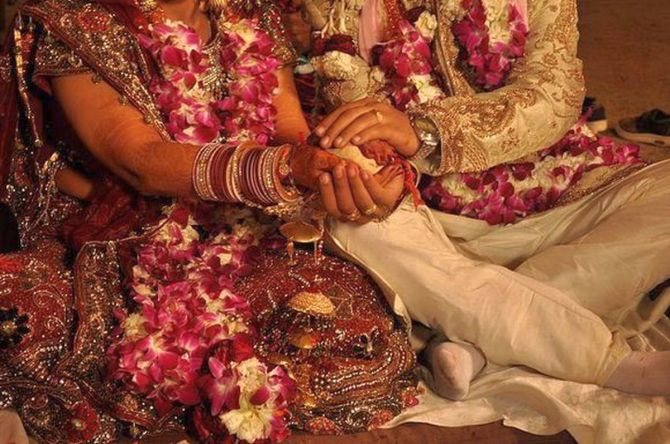Over 100 civil society organisations have urged the government against increasing women's minimum age of marriage, claiming it will do little to improve the health of mothers and infants.

In a joint statement, the rights organisations asked how increasing the minimum age of marriage is a step forward when it denies many more women matrimonial status and rights.
They also asked how will it help to criminalise families whose survival needs and insecurity compel them to not just marry early, but to also enter the workforce early.
The government is considering revising the age of marriage of women and for that a task force has been formed.
Prime Minister Narendra Modi also touched upon the subject in his Independence Day address.
However, the civil society organisations have urged the government against increasing the age of marriage, claiming "it will not further gender equality, women's rights or empowerment of girls, and will do little to improve the health of mothers and infants".
"It is only in the most superficial sense that having 21 years for both men and women is a sign of gender equality, but somehow this idea has great appeal in liberal circles.
"If legal equality should be implemented in the letter of law when it comes to age, it may be worth considering making it 18 years for both men and women, as is the case in most parts of the world," the statement endorsed by 2,500 young voices and over 100 civil society organisations said.
They said raising the age at marriage through law will only criminalise, not prevent, early marriage.
"Over the last few years there have been moves to make laws more and more punitive as if all the answers can be achieved through legal change. Merely having a new minimum age of marriage law for women at 21 years without the presence of enabling opportunities in the form of access to higher education and decent job opportunities translates effectively into young women being even more trapped in their natal homes," it said.
Parents in situations of disadvantage will feel constrained to marry them off by any means possible rather than wait till the age of 21 when dowry and marriage expenses would leave them debt ridden, the statement said.
The civil society organisations recommended that instead of raising the age of marriage, the government must strengthen schooling from pre-school to higher secondary as a bridge to higher education is absolutely vital, along with job guarantees and learn while you earn opportunities for adolescents, especially for those from marginalised sections.
"Reinforcing nutritional programmes in anganwadis and schools to address nutritional deficit among adolescents, especially girls, widening access to reproductive health, contraception, and abortion services for all, including preventing unsafe abortion and medical practices." it said.
The activists endorsing the statement include Enakshi Ganguly, independent activist and co-founder of HAQ: Centre for Child Rights, Madhu Mehra, executive director at National Coalition Advocating for Adolescent Concerns, Mary E John, senior fellow at Centre for Women's Development Studies and Kavita Ratna, Director-Advocacy at Concerned for Working Children, a child rights non-profit.










